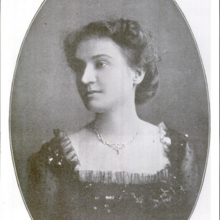
Mary Dunlop Maclean (pseudonym, Judith Herz; September 27, 1873 – July 12, 1912) was a writer and journalist and the first managing editor of The Crisis from 1909 until her death.
Early life
Mary Dunlop Johnson was born to white parents, Harriet Darling Johnson and Samuel Otis Johnson, in Nassau, Bahamas on September 27, 1873.
Her mother, who was a descendant of the Revolutionary War hero Paul Dudley Sargent and Governor John Winthrop, had been born in Maine, while her father had been born in Nassau to American parents.
Mary was sent to Boston, Massachusetts as a teenager to complete her education.
Career
In 1907, Maclean edited a collection of Abraham Lincoln's letters and speeches. Soon after, Maclean volunteered as managing editor of The Crisis beginning in 1909, working with W. E. B. Du Bois as an editor, after the First National Negro Conference. She was the only woman on the magazine's initial six-person editorial board. She used her skills as a journalist to conduct interviews and report to the NAACP on a lynching in Coatesville, Pennsylvania.
Maclean worked simultaneously on the Sunday staff at the New York Times, writing features such as a report from Sicily after the 1908 Messina earthquake. She used the pseudonym "Judith Herz" for at least one article in The New Era (a profile of the Yiddish-language playwright, Jacob Gordin).
Death and legacy
Maclean died, in 1912, from complications following surgery. She was 38 years old.
The staff of The Crisis established a memorial fund in her name, used to fund publications of the NAACP. Mary White Ovington chaired the memorial committee.
References
- Mary White Ovington, "Mary Dunlop Maclean" The Crisis (August 1912): 184-185.
- Mary Maclean, ed., Letters and Addresses of Abraham Lincoln (A. Wessels Company 1907).
- Jeffrey B. Perry, Hubert Harrison: The Voice of Harlem Radicalism, 1883-1918 (Columbia University Press 2008): 101. ISBN 9780231511223.
- Gary Dorrien, The New Abolition: W. E. B. Du Bois and the Black Social Gospel (Yale University Press 2015): 262. ISBN 9780300205602.
- Letter from Mary D. MacLean to W. E. B. Du Bois (July 10, 1911). W. E. B. Du Bois Papers (MS 312). Special Collections and University Archives, University of Massachusetts Amherst Libraries.
- David Levering Lewis, W. E. B. DuBois, 1868-1919: Biography of a Race (Henry Holt & Co. 1994): 410. ISBN 9781466841512.
- Dennis B. Downey and Raymond M. Hyser, Coatesville and the Lynching of Zachariah Walker: Death in a Pennsylvania Steel Town (Arcadia Publishing 2011). ISBN 9781625841032.
- "Mrs. Mary Dunlop Maclean" New York Times (July 13, 1912): 9.
- Mary Maclean, "In the Wake of the Disaster: Where Chaos Reigned and the Dead Were Unburied" New York Times (January 31, 1909): SM1.
- Beth Kaplan, Finding the Jewish Shakespeare: The Life and Legacy of Jacob Godin (Syracuse University Press 2012): 133. ISBN 9780815651758.
- "The Month's Work" The Crisis (September 1912): 237.
- "In Honor of Mary Dunlop Maclean" New York Times (November 10, 1912): 14. via Newspapers.com
